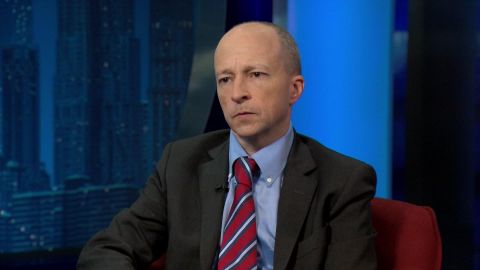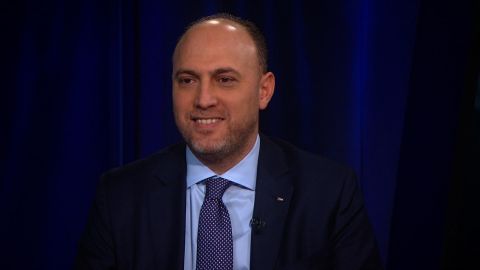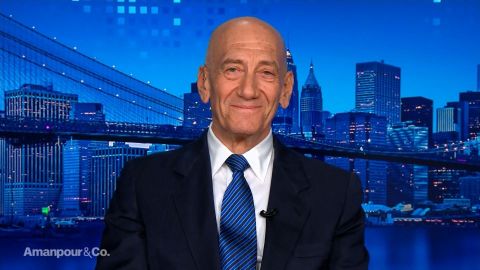Read Transcript EXPAND
CHRISTIANE AMANPOUR: So, voters of all ages need institutions they can trust, say our next guest, at a time when the contract is broken. Yuval Levin is a conservative commentator and director of social cultural and constitutional studies at the American Enterprise Institute. His new book, “A Time to Rebuild,” argues that institutions are the very fabric of society, and he tells our Hari Sreenivasan how these institutions need rebuilding themselves to remedy bitter divisions.
(BEGIN VIDEOTAPE)
SREENIVASAN: You’re arguing that the roots of today’s problems is not just about individuals, but about our faith in institutions collapsing. How’s that?
YUVAL LEVIN, AUTHOR, “A TIME TO BUILD”: Well, when we think about the kind of social crisis that we face now, a crisis that presents itself, in our politics, in our culture, even in the personal lives of a lot of Americans in the form of isolation and alienation, our natural inclination is to think about individual well-being. How’s the economy doing? Are people healthy? Are they safe? And on those fronts, things do look fine mostly. There are certainly problems, but they don’t explain the kind of crisis we’re living through. It’s really in our sociality, at the interstices of life, the connections between people, where we seem to be having problems. And to think about that, you have to think about more than individuals, because even when we think about our social lives in America, we tend to imagine American life as this big open space with lots of individuals, and they’re having trouble holding hands or connecting. And so we say we want to build bridges, we want to break down walls, cast a unifying vision. But what we’re missing is that we actually live our social lives in structures, in ways that shape what we do together.
SREENIVASAN: Yes.
LEVIN: And if American life is a big, open space, it’s not filled with individuals. It’s filled with these structures, and they’re called institutions. The things we do together take a certain shape. And it is in those shapes that our problems now present themselves. We have lost confidence in the institutions that structure our common life. That loss of confidence is very easy to see. It’s very widespread. But to really understand it, you have to ask some questions about why we have confidence in institutions and what it means to lose it.
SREENIVASAN: When you say the word institutions, as you mentioned, this kind of lack of trust that we have, my brain automatically fills in the blank with institutional corruption, institutional bureaucracy, institutional racism.
LEVIN: Yes.
SREENIVASAN: The brand of the notion of an institution has slipped significantly in a very short period of time.
LEVIN: Absolutely. And all those things are real, right? That kind of corruption, which I described in the book as insiderism, a way of using the power of the institution to advance the good of the individual, that’s the kind of corruption that’s always been with us. And it’s certainly with us now. And it undermines trust in institutions. There’s also a distinct kind of modern 21st century institutional corruption, where the problem is not just that the people within an institution are using their power in a corrupt way, but that the institutions don’t see themselves as shaping and molding those individuals. Rather, they’re understood as just providing a platform for people. The only thing the institution does, it gives you a stage to stand on and be seen and heard in our culture. And so, if you look, for example, at Congress, Congress is — we can think of it traditionally as a very formative institution. It shapes the way its members work, so that they work together to achieve some common ends. Right now, members of Congress often think of the institution as just a platform, a way to elevate themselves to get a better time slot on cable news or talk radio, to get a bigger social media following, to be heard. They use Congress to become players in the theater of our popular culture, rather than to make laws, to reach compromises, to find some accommodate that could help our country address its differences, so that, where people might have once used the microphone to try to get power, now people use power to try to get a microphone. And I think there’s a real confusion about the purposes of our institutions when they all just become stages. We see that in our politics. The president certainly does this too. He treats himself as a commentator in chief, rather than as a person with institutional responsibility. But I think you see that in corporate America. You see it in the academy. You see it in American religious life. It’s a distinct form of corruption that’s unique to our time, and I think has a huge amount to do with why we have lost trust in institutions, as we have.
SREENIVASAN: How much of the — let’s say, in the context of Congress, how much of the dismantling of institutional power in Congress is the responsibility of the members themselves–
LEVIN: Yes.
SREENIVASAN: — who seem, as you say, if they’re — if this has gone from a formative institution to a performative platform, they have ceded a tremendous amount of authority and power to legislate, to govern to the executive branch.
LEVIN: I think that’s quite right. When it comes to our politics, this problem is really rooted in a willful dereliction, particularly by the Congress. So, a lot of conservatives — and I’m a conservative — like to complain about the courts being too powerful and the administrative state, sometimes the president, being too powerful. All of those, it seems to me, are really functions of Congress being intentionally powerless and turning power over to other institutions, saying, we don’t want the responsibility to do this. We’re going to stake out broad goals and leave it to other people to figure out how to achieve them. The result of that is that Congress becomes an observer of the system that it is supposed to be guiding and driving. Now, there are also a lot of other incentives that members deal with. They understand themselves to be playing a part in a broad political, cultural theater, where what their voters want is to see them angry about the right things. And most of what they do is spend their time proving that they’re angry about the right things. So, if you attend a congressional committee hearing now, it basically consists of a bunch of individuals producing YouTube clips to use later in a campaign. And they’re not — they’re not communicating with each other. They’re not negotiating. They’re not bargaining. They’re performing. And they treat the Congress as a stage for performance. The result of that is, of course, a weaker Congress. It’s also driven by other forces that push on the institution. Transparency, which has many good things about it, can also be a downside. It has some costs that we have to think about.
SREENIVASAN: Right.
LEVIN: But at the core of this is a willful dereliction of responsibility. Members could have more power if they wanted to. And the fact is, that’s not what they want.
SREENIVASAN: How much of this has to do with the way that the political process have been influenced, for example, by money? Right now, once you get in there, if you’re a member of the House, one of your first jobs is to figure out how you can stay in there, how you can shore up the funds. And you’re being approached by one side of an argument or the other that has powerful lobbies that are coming up to you and say, hey, I can make this campaign contribution to you if you vote this way.
LEVIN: Right.
SREENIVASAN: So, there you are using the platform to perform for potential donors and supporters, instead of perhaps just your voters.
LEVIN: I think money is part of it. And the political culture around politics is part of it, too. That is, the expectation of voters that performance is what they will get out of their politicians is a key part of it. Certainly, that’s true of donors as well. I think that also points to another set of institutions around our politics that can protect members from these pressures some, but now don’t. And that’s the political parties. The parties really have a role to play in our politics. And the role is not to drive partisanship, but to channel partisanship, to build broader coalitions, and play some formative role in shaping the options that confront voters. Right now, the parties themselves have become just platforms for performance. They’re not — they’re not depositories of political expertise, in the way that they can be and have been. They’re just platforms. They just exist to display candidates, to display people who want to be candidates, and they don’t play the role of channeling money, of helping to form coalitions, and to forge platforms and policy agendas. The parties have an enormously important role to play in protecting politicians from some of the pressures we’re talking about. And when they become weak, partisanship, ironically, becomes strong. And these pressures just act directly on the politicians and make it impossible for them to function as policy-makers, which–
(CROSSTALK)
SREENIVASAN: So, by that definition, the Republican Party and the Democratic Party have been weakened just even in the past cycle.
LEVIN: Absolutely. The Republican Party and the Democratic Party now are just walking examples of failures of coordination. They can’t operate as private organizations, which is what they are. They’re not just public platforms. They can’t make decisions about who should represent them and who their candidates ought to be. All they can do is act as stages for narcissists, right, for people who can get attention. And they pride themselves in this. They say, anybody can get on the debate stage, anybody can make it through a process. That’s actually not a good thing. The parties have a role to play. And that role has a part in allowing our politics to emphasize responsibility, experience, things which aren’t — necessarily will come out of a direct democratic process, but are essential to the functioning of American democracy, ultimately. A weak Republican Party is how Donald Trump became its candidate. And I think we’re now watching a weak Democratic Party too in this race.
SREENIVASAN: As a conservative, what will the impact of Donald Trump be on the institutions that technically he sits on top of?
LEVIN: I think Donald Trump has acted like a kind of acid poured on a lot of our institutions. He is himself very powerfully disinclined to think in institutional terms. He also doesn’t understand himself as having been formed by a set of institutions to act as president. In fact, he hasn’t been formed by those institutions. Every one of our past presidents has been either a senior military officer or, in most cases, an elected official at some other level of government before becoming president. And that has shaped their understanding of what the role of the chief executive is. Donald Trump is the first president who has not been shaped by any of those institutions before rising to the presidency. What he has been shaped by is running a family business and then basically being a performer, functioning as a kind of — playing the role of a successful real estate developer in our popular culture. And he’s approached the presidency as another role to play, as another stage to stand on in a kind of reality show. And that’s how he takes — that’s what he takes the job to be. That’s what he values about it, as being the highest stage of all. And so he doesn’t think about his job in terms of institutions. And I think that the effect that has had is to cause many other people in our politics not to think about their jobs in terms of institutions. And whatever follows this will have to involve some recovery of institutionalism, of a sense of what it is to be an insider in American politics and why that’s valuable. And that has suffered quite a bit in the last few years.
SREENIVASAN: You differentiate in the book how the right views institutions from the left. You say — quote — “The right tends to argue about the role of government in a fairly abstract manner, discussing its boundaries more than how its institutions should operate within those limits. The left is now increasingly drawn to identity politics, which is a politics both devoid of and hostile toward institutions.” Why does this matter?
LEVIN: Well, the problem that we have now is that we have an anti- institutional politics on all sides. And so the question about the role of our institutions isn’t even a divisive partisan question. It’s simply not there at all. And so, on the left, you find — first of all, when the left thinks about American history, it tends to be in terms of vast movements that move our politics, rather than about institutions and organizations. When the right thinks about American history, traditionally, it’s been about ideas and concepts more than about institutions. Today, frankly, the American right is hostile to institutions. It’s hostile to the institutions that you would think conservatives would be trying to conserve, including our constitutional system. The right tends to treat everything as rigged against the public, a kind of populism that ultimately, I think, is hostile to the structure and nature of our institutions. That means that there is no party of the institutions in our politics now. And that argument has to be made in and to both parties from the outside. That’s part of the purpose of a book like this, is to help surface this problem in terms of our need for legitimate institutions.
SREENIVASAN: You have a chapter called “Informality Machine,” examples of how basically social media is accelerating these things now.
LEVIN: Yes.
SREENIVASAN: And you say that celebrity is the enemy of institutional integrity. What do you mean by that?
LEVIN: Yes, social media is almost perfectly suited to exacerbating the kind of problem we’re talking about, which is really, ultimately, a problem of transforming institutions from molds of behavior and character into platforms for performance. The professions are a good example of this. We can talk about the media, for example. Journalism, the power of journalism, is that it ensconcing individual within a framework of rules, a system, a pattern of determining what’s true and what’s false. And, ultimately, that allows people to trust an individual journalist, out of a sense that what you’re hearing has gone through a process that can reasonably determine what might be true and what might not be true. When a journalist takes himself or herself out of that process directly onto Twitter, and is just there in an ongoing way, providing both opinion and arguments, both reporting and assertions in a way that is not subject to that same process that makes it very hard for people to tell if what you’re watching is professional work product or just a person hanging out with his friends, that is a process of deprofessionalizing a professional journalist. And social media encourages this, creates enormous incentives for it, and thereby makes it very hard for institutions to play the roles that they need to play in our society. They make it hard for us to know who to trust. That’s part of what formality does for us. It lets us tell the difference between someone with authority and someone without authority. That can obviously go to excess. And formality easily goes to excess and becomes oppressive. But we need more than none of it. We need some of it to help us tell the difference between who we can trust and who’s just out there trying to mislead us.
SREENIVASAN: You also take a look in a couple of your chapters really about academia and what’s happened to college campuses. How do you find this erosion of the institution playing out, when you see these debates about who is welcome to speak on a campus and who is not?
LEVIN: Yes. The challenge on college campuses is that the universities, their educational institutions, certainly, they’re formative, right? They shape their students. But, ultimately, they have to be formative in light of an overall academic ethic that’s about teaching and learning and searching for truth. Increasingly, we find in our universities that they understand themselves as stages in our culture war, right and left, and where they’re stages for activism more than for learning and teaching. And when conservatives argue about being kept out of the university academic arenas, what they argue for is for their own safe spaces, for their own free speech. I think that’s a misunderstanding of what’s missing now in the academy. Free speech is important. It’s an essential prerequisite for academic freedom and the pursuit of truth, but it’s not the purpose of the university. What we need out of the university is an institution that helps us search for truth and distinguish — distinguish knowledge from falsehood. Ultimately, that means you need some kind of standard that lets you tell the difference between Milo Yiannopoulos, say, and Charles Murray, who’s a social scientist who is controversial. If you have a standard like free speech that can’t let you tell the difference, you probably haven’t answered the question of what the university is for. I think we have lost sight of what the university is for. And it’s becoming yet another stage for culture war performance, just as is happening in our politics, as is happening in the media, as is happening in a lot of our professions, in American religious life, where churches are institutions that are meant to form the souls of those within them, but, increasingly, they’re also just platforms for political performance. There’s a difference between enabling people to express themselves and forming people to become better. And I think our institutions need to see that difference, because they live on that — at the edge of that difference. That’s what they do.
SREENIVASAN: One of the through lines, whether it’s academia, whether it’s the press, whether it’s Congress, you could say that it’s been influenced by another type of institution, which has probably prospered, which is corporations. Those are structures. And they have grown more powerful in the past 35 or 40 years than any of the other institutions that you’re mentioning.
LEVIN: Yes. Well, that’s true. And in corporate America, too, I think it’s very important to insist on a sense of responsibility that goes beyond the pursuit of shareholder value, that corporations are crucial institutions in our society. They too have a role to play. And the question that people within them have to ask is not just, how do I build the brand, let alone how do I build my own personal brand, but the question is, what role do we have to play in society? And I think, in order to be in a position to insist on that, to demand that of our corporations, we have to also be demanding that of our other institutions. We have to see, in general, that people with power, people with authority also have responsibilities.
SREENIVASAN: This institutionalism that you’re talking about, or this resurgence or revitalization, would include a commitment to something a little bit more long-term than the short-sighted win, right, the notion that, even if you disagree with this person, they’re going to be around another week. But if it’s on the Internet, and I’m never really going to see you, I can say whatever I want and then walk out.
LEVIN: I think that’s part of what it needs that we don’t have. And another part is to be able to think about the future in practical terms. Right now, both parties approach the next election as a do-or-die question. They always think of our country as an inch away from the abyss. And if we don’t win this fight right now, then everything is lost forever. That’s just not true. And we have to be able to think of the political challenges we face as much more of a tug of war than a fight to the death. We’re pushing and pulling. The problems are still going to be here. We’re trying to look for ways to mitigate them some. That’s a much more practical way to approach America’s problems, but it’s also ultimately a more future-oriented way to think about those problems. Right now, our politics has amazingly little to do with the future. We don’t talk about where America is going to be in 2030. We talk about tomorrow. We talk about what Donald Trump did yesterday. We talk about the next election as if everything depends on it. 2030 is not so far away, right? It’s 10 years away. It’s as close to us as 2010 was, but we don’t imagine it. We don’t envision it. We don’t build for it, because our politics just isn’t in a mode of thinking about even the medium-term future. Part of what institutionalism offers us is a turning down of the volume, a lowering of the temperature, that allows us to actually build for the future. And I think the country is badly in need of that kind of politics.
SREENIVASAN: Yuval Levin, thanks so much.
LEVIN: Thank you.
About This Episode EXPAND
Former Israeli Prime Minister Ehud Olmert tells Christiane why he rejects President Trump’s Middle East peace plan. Husam Zomlot joins the program to offer a Palestinian perspective. Journalist Charlotte Alter explains the role of young American voters in the 2020 election. Conservative political analyst Yuval Levin sits down with Hari to discuss his plan for reviving the American dream.
LEARN MORE



